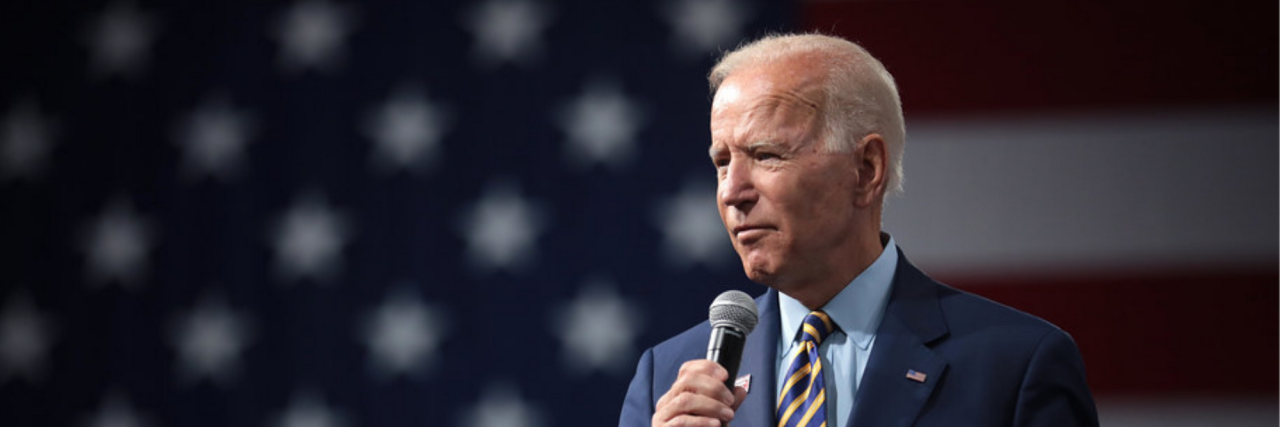Joe Biden Shouldn't Have to Defend His Son's Addiction
Editor's Note
If you or a loved one is affected by addiction, the following post could be triggering. You can contact SAMHSA’s hotline at 1-800-662-4357.
I’m a therapist who works with people struggling with addiction/substance use disorders. I watch my clients fight against their own minds and bodies, day in and day out, to overcome a disease that is relentless.
On Tuesday night during the first Presidential Debate, our President delivered arguably one of the lowest blows of his presidency, as he ruthlessly went after Hunter Biden — a man who fought for our country and fought for himself, battling drug addiction and all the pain that comes with that fight.
In case you missed it, Joe Biden was in the process of defending his late son, Beau Biden, against previous allegations that Trump called those who died fighting in war “losers” and suckers.” Beau Biden served in Iraq from 2008-2009 and died of a brain tumor in 2015.
Trump retaliated quickly, stating “I don’t know Beau, I know Hunter,” before continuing on to attack Hunter Biden for his substance use problem and alleging that Hunter was “dishonorably discharged” from the military for cocaine use. A fact check after the debate confirms that this statement was false; Hunter was not dishonorably discharged. He was administratively discharged from the U.S. Navy in 2014 after failing a drug test.
At this point, in what can only be described as a very emotionally charged moment, Biden turns to the camera and states:
“My son, like a lot of people, like a lot of people we know at home, had a drug problem. He’s overtaken it. He’s fixed it, he’s worked on it, and I’m proud of him. I’m proud of my son.”
You can see the full exchange here.
Social media erupted in anger and disbelief following this moment in the debate. There was an outpouring of support for Hunter Biden, Joe Biden and the millions of other families that are affected by addiction and substance use in America. According to SAMHSA (Substance Abuse and Mental Health Services Administration), 20.4 million people aged 12 or older had a substance use disorder in the past year.
Many took to Twitter to express their shock, support and positive messages:
I know it happened a couple minutes ago which feels like a lifetime ago in this debate, but: Biden looking directly at the camera and saying his son had a drug problem like many do and he loves him anyway was a really powerful moment that will resonate and stick with people.
— Laura Bassett (@LEBassett) September 30, 2020
Sending love to Hunter Biden tonight. No addict deserves to have their substance abuse problems politicized on national television for a talking point.
— POST WOOK (@POSTWOOK) September 30, 2020
How can we possibly eliminate mental health stigma when we have a leader who uses someone’s child’s addiction and mental health history as a means to discredit them during an argument? #presidentialdebate #2020debate
— Whitney Goodman, LMFT (@sitwithwhit) September 30, 2020
Trump’s attack on the Biden family is incredibly harmful to millions of people and their loved ones. It perpetuates a history of stigma and shame surrounding addiction. In a HuffPost Personal piece, guest writer Laura Cathcart Robbins speaks about her own reaction to the debate proceedings and her experience with addiction, recovery and stigma. “People in recovery have labored under this stigma long enough,” Cathcart Robbins says, “We’re not bad people trying to be good. We’re sick people trying to get better.”
If you or a loved one is battling addiction, keep fighting the good fight. You are warriors. We see you. We see your strength, your power and your determination. We see your hope. Working professionally with individuals battling to overcome addiction has opened my eyes to some of the most beautiful and inspiring parts of humanity. For those in recovery, every day may not be easy, but every day is a gift. Little by little, with the help of one another, we will continue to overcome this disease. We will fight back against the harmful stigma. And we will do it all, simply, one day at a time.
If Tuesday night was hard for you, please reach out for help. Talk to someone. Go to a meeting. You don’t ever have to do this alone.
Resources:
Substance Abuse and Mental Health Services Administration (SAMHSA) National Helpline:
1-800-662-HELP (4357)
FindTreatment.gov
National Suicide Prevention Lifeline: 1-800-273-TALK (8255)

